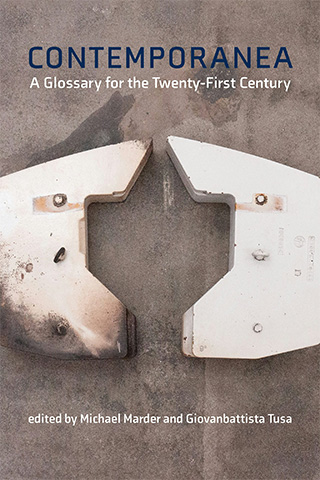Timothy Morton: On Ecotrauma

I began to feel it myself in 2019. I was in Rotterdam doing some dialogues, lectures, and interviews. The hotel room was quiet and cozy and the bed seemed to call to me. Come on, lie down in the fetal position, you know what’s going to happen next.
I did, and I didn’t. I knew this huge well of grief about the state of the planet was about to crash over me. I didn’t know exactly what that was. Since then I’ve come to realize that grief is your past giving your future a massage. Grief is your soul massaging your psyche. I like to use that word now, soul. I prefer using soul to mind, not that they’re the same concept at all. “Mind” automatically seems to evoke “versus body” in the minds of everyone, including myself, no matter how hard we try, no matter how many times we’ve noticed that the brain is an organ of the body and that the human mind emerges from the brain. (I don’t know how plant sentience emerges or how far “down” consciousness goes in the physical universe.)

Soul is not without its problems. One pictures a ghost made of smoke in a bottle. One also might hear “versus body” after “soul.” But I began to think that soul was a vague cloud or heap of everything one has ever said or done or touched or seen . . . overlapping inevitably with others’ vague clouds of the same kinds of things. All of one, rather than the narrow sliver one takes to be one’s self or one’s mind. Soul, therefore, is to a large extent invisible to “me” in the so-called present moment. If soul is a city, I am a narrow alleyway in that city, at most. Or soul is this essay plus the paper it’s written on, whereas I is the blinking cursor that marks where my typing fingers have come as I write this. Or I is a slice of a four-dimensional worm extended in time and space called soul. There are several ways of thinking about it, and all would require a lot of explication and argumentation to get just right.
I will stick with the object-oriented idea that to be a thing, to be an entity, is to have a necessarily withdrawn or mysterious quality; to exist means that one cannot be laid totally bare, one cannot be completely splayed out to the accessing intellect, or hand, or eye, or particle beam. One cannot be reduced to a measurement of oneself. Perhaps I is simply a measurement, in the same way as 2:30 p.m. is a measurement, not time as such.
“In a sense, ecotrauma is simply the awareness that we inhabit a biosphere.”
No matter, at least for our purposes. For me in that hotel in Rotterdam, soul was a gigantic wave, like the one in the film “Interstellar,” or the one that was haunting me from my ecotraumatized imagination. I had started seeing them a few weeks before. They came unbidden, as phantasms. You might have thought that someone who writes about ecology all the time would be imagining such things all the time. I certainly talk about them in my work. I’ve disturbed many people with images of terrifying timescales, for example, in my book “Hyperobjects.” But to my shame, I am going to admit here that I had never really done it to myself. Not to the point of doing what I myself have proposed — scream, cry in agony. Until I did, that morning in February 2019 in Rotterdam.
I spent about eight hours in the fetal position on the bed and in a very hot bath, crying, sometimes feeling like I was about to throw up, dry heaving. One of my best friends has been a hospice chaplain and is very familiar with grief, and I had learned from him to work with anything that would trigger it, once I could feel it coming. Music helps. For me, in that moment, two songs came to mesmerize me no matter what I thought of them as pieces of music: “Children Say” by Level 42 and, after a few hours, “All I Can Think about Is You” by Coldplay. Or rather, the videos for those songs. I played them on loop for four hours each. “Children Say” is evidently about children and innocence, not ignorance but the kind of weaponized harmlessness one finds in the poetry of Blake. “All I Can Think about Is You” is addressed to the biosphere. Space prevents me from analyzing them here, but I would encourage the reader to watch both videos on YouTube. Then I got dressed and went to do my job.
I am the inner bodyworker, says grief. Go on, you know you . . . want to? You might not want to, but it’ll make it worse if you hold it in any more. Go on, lie on the bed, curl up, and I’ll palpate your abdominal muscles. You’ll cry, scream, sob, throw up. Then I’ll leave you—on my own time, there’s no way to schedule me, I’m afraid. I’ll come and visit you again, but again, it’ll be on my own time.
The past is evidently what is still happening. It is not a dot on a timeline. A good definition of trauma is simply “the present moment.” But this word present, especially for someone who will never renounce their deconstructive training, is simply a scalable convenience. You can cut it to any size you want. It’s not actual in the way that past and future are. If you want to bake a potato, your present is about two hours. If you want to colonize the Spice Islands in 1500, your present is several months, and you have to invent credit and perspective geometry (for mapping) in order to cope with this time window. If you are a gravity wave, your present is measured in femtoseconds. Present is an arbitrary construct.
Slavery is still happening. Not just because people are still enslaved, but because the legacy of slavery in the United States and elsewhere is ongoing. I use this example not just because it is intense and salient, but because it’s highly germane to an essay on ecotrauma. There are many origins of an event as colossal as the Anthropocene, but one of them, the most significant one, is the moment of European settler colonialism beginning in the mid-seventeenth century. During this moment, humans and plants and animals and bacteria and viruses and who knows what else (the list might be very long) were transported across Earth, both accidentally and on purpose. Such was the impact on Earth’s atmospheric systems that many now hold that settler colonialism caused the “little Ice Age” of the later 17th century.
It also caused what was eventually called the United States, and the U.S. Constitution is riddled with slavery artifacts. The electoral college, for example, through which the votes of ordinary people are funneled, was designed to give the owners of enslaved people a bloc vote by counting one slave as three-fifths of a person. This is the mechanism that delivered to the world the presidency of Donald J. Trump. Slavery is now.
Think about the biggest trauma of all, the one called Universe, otherwise known as the Big Bang. Everything around you, your hands, the door, the smell of dust after rain, is the current state of that explosion. Everything around you right now is, among other things, the wavefront of the Big Bang. To exist is to inhabit overlapping ripples of trauma. An event is a splash or an explosion, not a dot. It’s in motion. What is shocking about trauma is the damage it does to an idea that is itself damaging, the idea that time is a line made up of a succession of points. This idea of time as a line, indeed as an arrow, is very much embedded in the colonialist narrative of historical progress, embodied (for example) in the idea of the dialectic of Hegel — history moves forward — and destroyed in the idea of Darwinian evolution based on random mutation.
So, in a sense, the biosphere as such is itself a trauma. Oxygen is a trauma if you are an anerobic bacterium, an explosion that is still continuing. It began about three billion years ago. Do you breathe oxygen? It means that this, the Great Oxygen Catastrophe, is not just a dot on a line on Wikipedia. It’s happening now. So, in a sense, ecotrauma is simply the awareness that we inhabit a biosphere. They don’t call a geological period the Cambrian Explosion for nothing.
Ecotrauma, then, is the shock felt by people who have lived according to lines and arrows realizing that time and events and being alive isn’t about lines and arrows at all, and that lines and arrows have done a lot to destroy the biosphere and to summon the very trauma that is now haunting them. How long do white men have to be shocked and horrified the same way everyone else has been for quite a while now? I’m not sure we have very long. It’s a bit embarrassing, to say the least.
But in a more local sense, ecotrauma is the very genuine pain felt by anyone with a pulse at the state of Earth today. Ecotrauma is now recognized by psychotherapy — there is now a Climate Psychology Alliance in the UK, where therapists such as Caroline Hickman work extensively with young people in particular trying to help them deal with ecotrauma — that is, an accurate sense of what is now the case. The point of any sophisticated therapy is not to “get rid of” the trauma; that might be impossible and counterproductive. As the Climate Psychology Alliance slogan puts it, “Don’t grow up — grow down.”
And as Theodor Adorno puts it in his essay “Progress,” an essay with great and poignant relevance to the climate crisis, genuine progress would look like regression or childishness. His example is Nietzsche weeping at the sight of a horse being whipped. Nowadays, anyone with a decent sense of right and wrong would be accepted at once for behaving like Nietzsche, but in the late 1800s, weeping with and embracing a horse was seen as regressive, decadent, and childish. Then there is, Adorno says, the fake progress that is so often taken to be actual progress, namely, the building out of the past into the future. In a way, the colonialist line doesn’t move at all. The present just metastasizes.
The author of this essay has been diagnosed with complex PTSD and is well aware of what trauma is like concerning aspects of their life other than the climate crisis and the sixth mass extinction event. But they were quite late to realize this about themselves and perhaps should be thankful to ecotrauma for being the vanguard of a number of shocking realizations that have followed. There is nothing wrong with realizing you have been wounded. To rid oneself of the wound might be to erase one’s very soul, let alone one’s I or oneself. Instead, one learns to live with the knowledge that one is wounded.
“To forgive is to allow for some breathing room in the soul to do new things — in other words, so that one can allow the future to be different from the past.”
But to exist as such is to be wounded. To exist is to be finite, not simply such and such a size and for such and such duration, but ontologically finite. To exist is to be incapable of being fully appropriated, accessed, or grasped, even by oneself. This is the intrinsic ontological flaw that makes the others possible. There are cracks in our souls and in the biosphere because there are cracks in reality as such, which doesn’t for one second excuse the people who and the processes that made these cracks in our biosphere.
To process trauma, then, is not to get rid of it but to forgive. And to forgive is not to gaslight oneself that nothing bad actually happened. To forgive is to allow for some breathing room in the soul to do new things — in other words, so that one can allow the future to be different from the past. The phenomenology of forgiveness is not a concept or a linguistic performance such as “I now pronounce you man and wife.” I forgive you is a feeling, a phenomenon that I have scant ability to write about, but which I have indeed begun to experience, not as an idea but as an embodied “feeling” — I put that word in quotation marks because it really does not seem up to the job. Something about the word forgive acts like emotional onomatopoeia — there is a giving of space or an allowing for room that enables one to hold seemingly very contradictory thoughts and feelings in mind without going crazy. The terrible thing happened, and yet one is not caught in it; one can have ambiguous feelings about the perpetrator, and so on.
If human beings are going to work genuinely and effectively on the climate crisis, they are going to need to work at a psychological level so profound that perhaps only religions have discovered the intensity with which these tasks are to be carried out. What is required right now is the fervor and steadfastness of the Civil Rights era or Gandhi — far from a mere blueprint for action on carbon emissions or even new kinds of political and economic organization. What is required is a reckoning with ecotrauma. And this implies processes that, unfortunately, do not appear to be practical, simple, immediate, or powerful at all.
People will sometimes condescendingly say, when they talk about doing something difficult, “We have to learn to walk and chew gum at the same time.” But if the politics and economics of ecological justice are like walking, and working with ecotrauma is like chewing gum, then imagine that piece of gum is the size of a skyscraper and tastes of all the terrible things you’ve ever swept or flushed or rinsed away. Now walk — we have to.
Timothy Morton is Rita Shea Guffey Chair in English at Rice University and the author of over a dozen books, including “Hell: In Search of a Christian Ecology” (Columbia University Press) and “Being Ecological.”
This article is excerpted from the volume “Contemporanea: A Glossary for the Twenty-First Century,” a multidisciplinary collection that rethinks our present moment and anticipates the key concepts that will shape and direct the 21st century.



